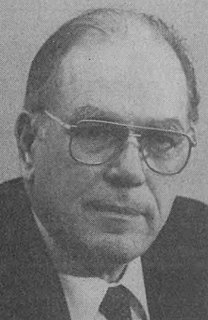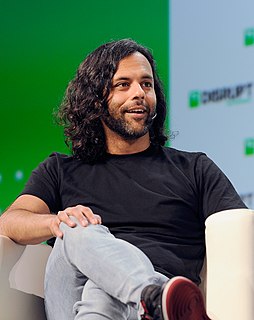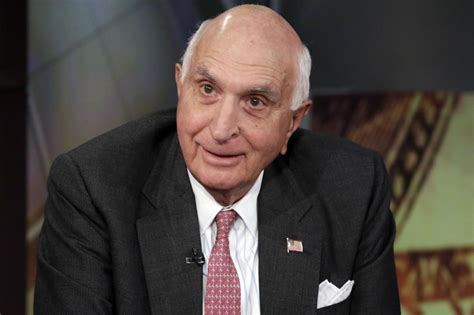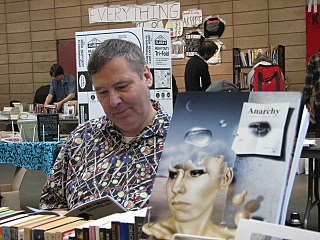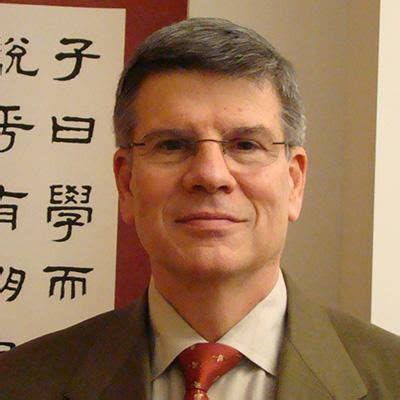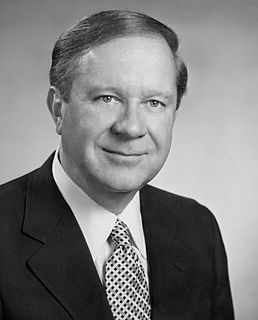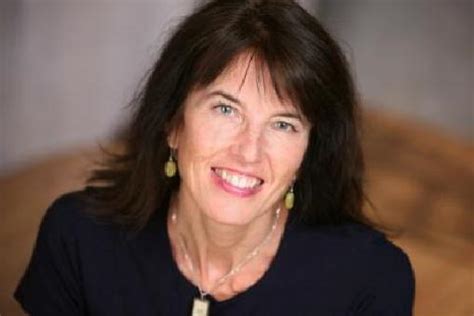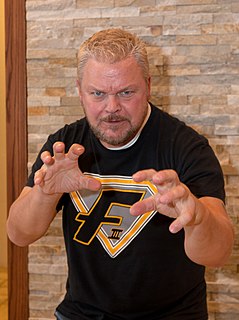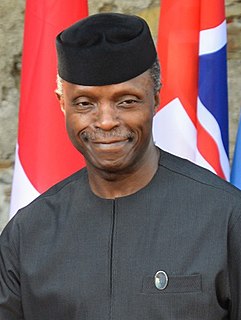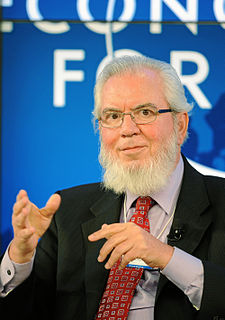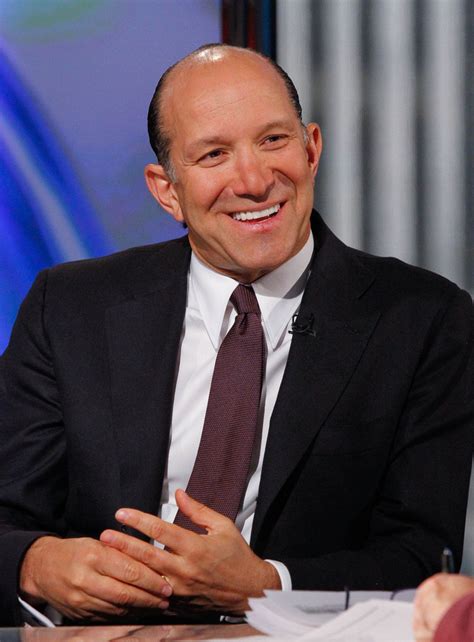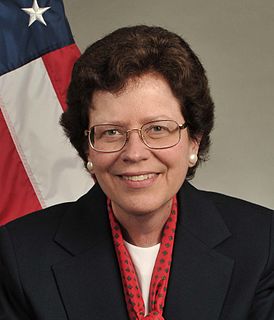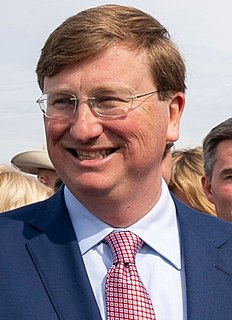Top 1200 World Economy Quotes & Sayings - Page 18
Explore popular World Economy quotes.
Last updated on November 15, 2024.
A Resource-Based Economy is in the application of the methods of science with human concern and environmental concern. If we used the scientific method throughout the world, the probability of war drops to zero. The probability of human suffering disappears. Deprivation, poverty, crime - all those things tend to disappear because there's no basis. I'm strictly concerned with the environment that people are raised in and if that environment is altered, so will behaviors be altered.
David Rockefeller is the most conspicuous representative today of the ruling class, a multinational fraternity of men who shape the global economy and manage the flow of its capital. Rockefeller was born to it, and he has made the most of it. But what some critics see as a vast international conspiracy, he considers a circumstance of life and just another day's work... In the world of David Rockefeller it's hard to tell where business ends and politics begins
I'm concerned with the world economy, I'm a specialist in forecasting in that area, and I have a lot of influence in that area, naturally. How big it is, or how big it is personally, is not relevant. The fact is, I'm on the case, where other people are not, and more and more people realize, again and again, that I'm on the case!
It's not just global warming, it's not just a loss of biodiversity, it's not just the pollution of our oceans and the clearing of our rainforests and all these complicated systems, The [11th Hour] movie talks about the world economy, it talks about politics, it talks about personal transformation and environmental consciousness that we need to have in this generation to implement a lot of these changes that need to occur.
Now we're in a very different economy. Throughout the late 1980s and 1990s American management started to do the right things. There was extraordinary investment in technology. The dominant questions now are less how to do it better, how to manage better, how to make the economy better, than how to have fuller and more meaningful lives. Because the irony is, now that we've come through this great transition, even though our organizations and our people are extraordinarily productive, many feel that the nonwork side of life is very thin.
I've never been able to get it straight about what these people who are worried about the trade deficit are worried about. When they say that we're buying too much from overseas, that we're sending too many dollars overseas to get all these goods and services they got, they're saying that the American dollar is too strong and that is hurting our economy. And the result of this will be that the American dollar will get too weak, and that will hurt our economy.
I cannot for the life of me understand why the American market keeps going up. Our economy has some real challenges. The infrastructure's falling apart. We're destroying jobs with technology. We are keeping the best and the brightest from around the world from coming to America to create new jobs and create new businesses. All of those things would give you pause to worry about the future.
Saving the world requires saving democracy. That requires well-informed citizens. Conservation, environment, poverty, community, education, family, health, economy- these combine to make one quest: liberty and justice for all. Whether one's special emphasis is global warming or child welfare, the cause is the same cause. And justice comes from the same place being human comes from: compassion.
... the place where [adults] pass the most time and submit to the closest control is at work. Thus, without even entering into the question of the world economy's ultimate dictation within narrow limits of everybody's productive activity, it's apparent that the source of the greatest direct duress experienced by the ordinary adult is _not_ the state but rather the business that employs him. Your foreman or supervisor gives you more or-else orders in a week than the police do in a decade.
The book I'm looking for,' says the blurred figure, who holds out a volume similar to yours, 'is the one that gives the sense of the world after the end of the world, the sense that the world is the end of everything that there is in the world, that the only thing there is in the world is the end of the world.
Despite its protests to the contrary, modern Christianity has become willy-nilly the religion of the state and the economic status quo. Because it has been so exclusively dedicated to incanting anemic souls into Heaven, it has been made the tool of much earthly villainy. It has, for the most part, stood silently by while a predatory economy has ravaged the world, destroyed its natural beauty and health, divided and plundered its human communities and households.
I think of the old slavery, and of the way The Economy has now improved upon it. The new slavery has improved upon the old by giving the new slaves the illusion that they are free. The Economy does not take people's freedom by force, which would be against its principles, for it is very humane. It buys their freedom, pays for it, and then persuades its money back again with shoddy goods and the promise of freedom. "Buy a car," it says, "and be free. Buy a boat and be free." Is this not the raw material of bad dreams? Or is it maybe the very nightmare itself?
There are but three political-economic roads from which we can choose... We could take the first course and further exacerbate the already concentrated ownership of productive capital in the American economy. Or we could join the rest of the world by taking the second path, that of nationalization. Or we can take the third road, establishing policies to diffuse capital ownership broadly, so that many individuals, particularly workers, can participate as owners of industrial capital. The choice is ours.
For the Democrats, they're trying to avoid having the Sanders-Clinton debate over and over again. But, to some degree, they're sentenced to that debate. Clinton is much more embracing of the global economy and the international world order. Sanders and Warren are much less so. And they have got to figure out which side the party is on, if they're going to have a clear message. I think this is probably one you probably can't straddle.
I favor the policy of economy, not because I wish to save money, but because I wish to save people. The men and women of this country who toil are the ones who bear the cost of the Government. Every dollar that we carelessly waste means that their life will be so much the more meager. Every dollar that we save means that their life will be so much the more abundant. Economy is idealism in its most practical form.
I care deeply about women's rights. I have been an outspoken advocate for them for many years and as secretary of state I carried that message around the world because empowering women, providing for women's rights, their full participation in society, politics, the economy is not only a matter of individuals being able to chart their own futures. It's good for democracy and it's good for peace and prosperity.
Trump's vision for America parallels greatly with the vision that Ronald Reagan used and he implemented to revive the country during a very similar time where we had a president who told us that we were in a time of malaise in the American economy and that things are just gonna be that way for a while. Reagan steps up in that great first inaugural address and says, "And why shouldn't we dream great dreams? After all, we're Americans." And the American people came roaring back, the American economy came back.
Progressive visions pale and are smashed next to the normalization of market-driven government policies that wipe out pensions, eliminate quality health care, punish unions, demonize public servants, raise college tuition, and produce a harsh world of joblessness - all the while giving billions and huge bonuses, instead of prison sentences... to those bankers and investment brokers who were responsible for the 2008 meltdown of the economy and the loss of homes for millions of Americans.
The world should have stopped, but it didn't. The world kept on going. How can the world just keep on going? An earthquake in India kills a thousand people, and the world keeps on going. A famine in China kills a million people, and the world keeps on going. The twin towers of the World Trade Center buckle and fall, and the world, the world keeps on going.
When I'm writing about complicated subjects, it usually involves a world. It could be the world of Scientology or the world of Al Qaeda, or the world of counter-terrorism.I look for emblematic beasts of burden - what I call "donkeys" - who can carry the reader through this world. They serve a different purpose. Donkeys are not especially interesting or likeable, but they are serviceable. They will take you into this world. The distinction I'm trying to make is: It's not about them. It's about the world.
I believe that with the complete formation of the global Zionist network, they have seized control of the fate of the European governments, and of the US government. To the independent countries in the world, I would like to say: You should know that the influence of the Zionist network on your culture, your politics, and your economy is tantamount to a violation of your independence. They cling like ticks. The moment they gain influence, they never stop.
If I were a candidate for running, I'd say, "Look at what the economy has done." It's strong. We've created a lot of jobs. I'd be telling people that the Democrats will raise your taxes. I'd be reminding people that tax cuts have worked in terms of stimulating the economy. I'd be reminding people there's a philosophical difference between those who want to raise taxes and have the government spend the money, and those of us who say, "You get to spend the money the way you want to see fit. It's your money."
Nearly one billion women and men, a third of the world's workforce, are either unemployed or unable to earn enough to keep themselves out of extreme poverty. There are 100 million new entrants into the labour market each year. Up to 90 percent in some regions are in the informal economy. 180 million kids are engaged in the worst forms of child labour. Put it all together and it is not only morally unacceptable, but politically dangerous
On healthcare we are the prisoner of our past. The way we got to develop any kind of medical insurance program was during World War II when companies facing shortages of workers began to offer healthcare benefits as an inducement for employment. So from the early 1940s healthcare was seen as a privilege connected to employment. And after the war when soldiers came back and went back into the market there was a lot of competition, because the economy was so heated up.
When I consider the multitude of associated forces which are diffused through nature - when I think of that calm balancing of their energies which enables those most powerful in themselves, most destructive to the world's creatures and economy, to dwell associated together and be made subservient to the wants of creation, I rise from the contemplation more than ever impressed with the wisdom, the beneficence, and grandeur, beyond our language to express, of the Great Disposer of us all.
Given our inevitably incomplete knowledge about key structural aspects of our ever-changing economy and the sometimes asymmetric costs or benefits of particular outcomes, a central bank... need to consider not only the most likely future path for the economy but also the distribution of possible outcomes about that path. They then need to reach a judgment about the probabilities, costs, and benefits of the various possible outcomes under alternative choices for policy.
It is eminently possible to have a market-based economy that requires no such brutality and demands no such ideological purity. A free market in consumer products can coexist with free public health care, with public schools, with a large segment of the economy -- like a national oil company -- held in state hands. It's equally possible to require corporations to pay decent wages, to respect the right of workers to form unions, and for governments to tax and redistribute wealth so that the sharp inequalities that mark the corporatist state are reduced. Markets need not be fundamentalist.
The transition to a low-carbon economy will be one of the defining issues of the 21st century. This plan sets out a route-map for the UK's transition from here to 2020...every business, every community will need to be involved. Together we can create a more secure, more prosperous low carbon Britain and a world which is sustainable for future generations.
In my teens I saw the world in only black and white. Now I know that most things exist in a certain gray area. Though it took a while to get here, I now call this gray area home. I once believed that participating in a capitalist economy would be the death of me, but now realize that agonizing over the political implications of every move I make isn’t exactly living.
Common sense! It's nothing more than common sense for the preservation of our culture, the preservation of our country, the preservation and growth of our economy. And yet Jim Acosta and Glenn Thrush - and everybody in the press corps and practically every other Democrat - hears this and the only reaction they have is, "No compassion! No compassion for the less fortunate! No compassion for the victims of the world!"
R&D generally has been a bipartisan thing, because in the IT space, in the medical space, the U.S., the benefits to ourselves and the world and our economy have been very, very clear. I'm hopeful we can make a very strong case there. Energy is actually harder; it takes more time to get a product, but if you do it's a very, very big market and the constraints of doing that in a clean way are more obvious all the time.
Monogamy, or restrictions by law to one wife, is no part of the economy of heaven among men. Such a system was commenced by the founders of the Roman Empire... Rome became the mistress of the world, and introduced this order of monogamy wherever her sway was acknowledged. Thus this monogamic order of marriage, so esteemed by modern Christians as a hold sacrament and divine institution, is nothing but a system established by a set of robbers.
In the name of economy a thousand wasteful devices would be invented; and in the name of efficiency new forms of mechanical time-wasting would be devised: both processes gained speed through the nineteenth century and have come close to the limit of extravagant futility in our own time. But labor-saving devices could only achieve their end-that of freeing mankind for higher functions-if the standard of living remained stable. The dogma of increasing wants nullified every real economy and set the community in a collective squirrel-cage.
We love a world in which the people in the white hats get rewarded and the people in the black hats pay the price. And that I have to say doesn't happen very often, particularly in a very complex economy. We're in a time of panic where people have lost trust in what the banks are doing, what the investment firms are doing - lost trust beyond a level of reasonableness, to be honest. And, it's got to be stopped.
At the moment we are hard-wired into the European markets - 50% of our exports go to Europe - and that has not been good for the UK. So I'm not saying "make Britain entirely dependent on China". I'm saying "let's diversify a bit". When I became chancellor, China was our ninth largest trading partner. This is the world's second biggest economy. China was doing more business with Belgium than it was with Britain.


